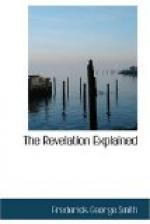Three of the horns, or temporal kingdoms, were overthrown in order to give room for the complete development of this politico-religious power. Since great changes have frequently occurred among the nations of Europe originally embraced in the ten minor kingdoms, different powers have been referred to as the three described in Daniel’s prophecy; but the most satisfactory explanation to my mind is that of the three kingdoms in Italy that were overthrown as if to give the hierarchy room for development, and that gave the Papacy its first temporal sovereignty, thus completing the symbol by constituting her a civil as well as an ecclesiastical horn.
Odoacer, in A.D. 476, overthrew the old empire of the West and established the kingdom of the Heruli in Italy. Seventeen years later it was subverted by Theodoric, who established the kingdom of the Ostrogoths, which continued sixty years; then it, in turn, was overthrown by Belisarius, but was soon succeeded by the Lombards. The Lombard kingdom was subverted by Pepin and Charlemagne, who, as champions of the church, gave a large part of their dominions to the See of Rome and thus favored the Papacy with her first temporal power. Thus were the kingdoms of the Heruli, Ostrogoths, and Lombards plucked up by the roots upon the very territory occupied first by the Papacy as a temporal power, and as if to give it room.
The careful student of Daniel 7 will notice immediately the striking similarity between the politico-religious system symbolized by the little horn and the leopard beast of Revelation 13 under consideration. The following parallels between them prove their identity:
“1. The little horn was a blasphemous power: ’He shall speak great words against the Most High.’ Dan. 7:25. The leopard beast of Rev. 13:6 does the same: ‘He opened his mouth in blasphemy against God.’
“2. The little horn made war with the saints, and prevailed against them. Dan. 7:21. This beast also, Rev. 13:7, makes war with the saints, and overcomes them.
“3. The little horn had a mouth speaking great things. Dan. 7:8, 20. And of this beast we read, Rev. 13:5: ’And there was given unto him a mouth speaking great things and blasphemies.’
“4. The little horn rose on the cessation of the Pagan form of the Roman empire. This beast rises at the same time; for the dragon, Pagan Rome, gives him his power, his seat, and great authority.
“5. Power was given to the little horn to continue for a time, times, and the dividing of time, or twelve hundred and sixty years. Dan. 7:25. To this beast also power was given for forty and two months, or twelve hundred and sixty years. Rev. 13:5.
“6. At the end of the twelve hundred and sixty years the universal dominion of the little horn was to begin to decline, being consumed and destroyed unto the end. Dan. 7:26. This beast, also, Rev. 13:10, was to be led into captivity and ‘killed with the sword.’”




